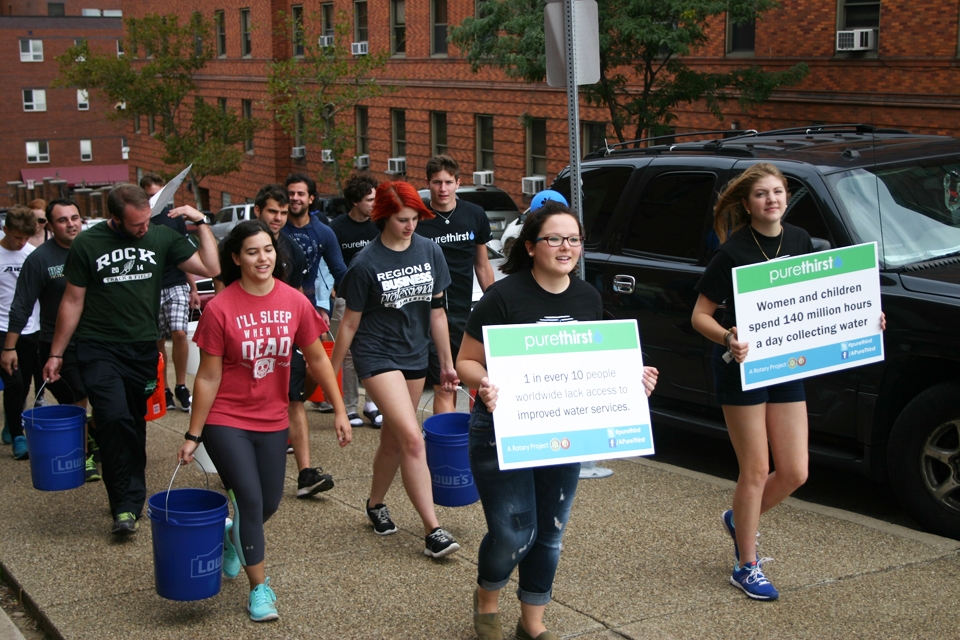

A photo from Pure Thirst’s 2015 Water Walk. The group works to improve water quality in Africa, where they traveled this summer.
Hallie Lauer | Staff Writer
A student-run organization at Duquesne is making big waves in addressing the global water crisis.
The Pure Thirst group is about to put on their fourth annual Water Walk, which is scheduled for Oct. 2. Students can pre-register for the walk online for $5 or register in person the day of the event for $10.
“[The walk] simulates the trek women and children make daily to bring water back for their families,” said Olivia Erickson, a senior pharmacy major and project coordinator for Pure Thirst.
The goal of the Water Walk, which will start at 11:45 a.m., is to promote awareness that there are still places in Africa that do not have clean drinking water. Many families must walk one to three miles to have access to water.
Their focus is the town of Olkokola, located in Tanzania. Their main goals were to educate students and staff in the town’s primary schools with sanitation lessons, test new ways to remove fluoride from the town’s water and complete a Rotary International grant, which funds piping updates and new latrine blocks for the schools, according to Organization Director and business school senior Catherine Hull.
The Tanzanian government installed the pipeline back in the 1970s and was remodeled during the summer trip. The organization plans to return to Tanzania in July of 2017.
“Right now, we’re keeping our focus there [in Tanzania], following the beliefs of Duquesne by building authentic relationships,” Erickson said
Aside from the Water Walk and the trip to Africa, Pure Thirst has another campus event called Asante Rafiki, which means “Thank you, friends” in Swahili, the official language of Tanzania. The event is for donors from the previous year and is used as a way to thank donors and show what their money has been used for, as well as to give an update on the accomplishments of the organization. It also is a way to discuss plans for the future of the group.
Pure Thirst was founded in 2010 by students with the mission of providing improved water services to people all around the world. Their other goals include engaging communities without access to clean water, educating students on the global water crisis and empowering communities to participate in awareness events.
“The group is a bit more unique than your average club on campus,” said Hull.
Pure Thirst is supported mainly by Rotary International, a global service organization and Duquesne’s Mission & Identity organizations.
Pure Thirst accepts members from all majors and schools at Duquesne. This is what makes them a “cross-disciplinary group,” Hull said. This means that each member helps the organization in ways which are supported by their own fields of study.
“As a business student, I am able to focus on the finances and business structure,” Hull said. “Conversely, our members in sciences are able to focus on the concepts behind improving water quality.”
Pure Thirst is still accepting new members and will have a table out on A-Walk during Duquesne’s Autumn Fest, which takes place this weekend.
“Stop by our table and chat,” Hull said. “This organization is a great way to pair any major with real world experience in your major. Become a part of this great cause.”





The US government chooses to carry out militarily attacks in other countries, which have uncertain benefits at best. It could choose to spend that money on providing safe drinking water in poor (and not so poor) countries instead, which has guaranteed benefits. That gives you a good idea of the priorities of the political elite.
I have asked many forced-fluoridation fanatics to tell me how much accumulated fluoride in the body they think is safe. So far not a single one of them has been able to answer the question.
http://forcedfluoridationfreedomfighters.com/a-preliminary-investigation-into-fluoride-accumulation-in-bone/
It is unlikely to just be a coincidence that the US, Australia, and Ireland, which have had high rates of forced-fluoridation for decades, also have high rates of joint problems, and poor health outcomes in general.